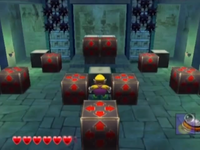Arrow Block (Wario World): Difference between revisions
From the Super Mario Wiki, the Mario encyclopedia
Jump to navigationJump to search
No edit summary |
m (Text replacement - "(\| *author *= *Nintendo *)(\|[^\n}]*publisher *= *Nintendo[^\n}]*)([\|}])" to "$2$3") |
||
| Line 2: | Line 2: | ||
{{distinguish|Arrow Lift (Super Mario 64)}} | {{distinguish|Arrow Lift (Super Mario 64)}} | ||
[[File:PecanSandsSub2.png|thumb|Wario with some Arrow Blocks surrounding him]] | [[File:PecanSandsSub2.png|thumb|Wario with some Arrow Blocks surrounding him]] | ||
'''Arrow Blocks'''<ref>{{cite | '''Arrow Blocks'''<ref>{{cite|date=2003|title=''Wario World'' instruction booklet|page=22|language=British English|publisher=Nintendo of Europe}}</ref><ref>{{cite|author=Nintendo|date=2003|title=''Wario World'' instruction booklet|page=24|language=American English|location={{wp|Redmond, Washington|Redmond, WA}}|publisher=Nintendo of America}}</ref> are gray metal [[block]]s found inside [[trapdoor (Wario World)|trapdoor]] sub-levels in ''[[Wario World]]''. An Arrow Block looks like a gray block with four red arrows pointing in the four cardinal directions on each side. If Wario [[punch]]es the block, it goes sailing in a straight line until it hits a wall, causing it to stop; if it hits another Arrow Block, that block starts to move instead, potentially resulting in a chain reaction of multiple blocks. Arrow Blocks are generally used as [[platform]]s to help [[Wario]] reach previously inaccessible ledges containing [[Red diamond (Wario World)|red diamond]]s and [[Gold Statue]] pieces. Should Wario [[Ground Pound|ground-pound]] an Arrow Block, it moves downward. | ||
==Names in other languages== | ==Names in other languages== | ||
Revision as of 17:19, August 5, 2024
- Not to be confused with Arrow Lift (Super Mario 64).
Arrow Blocks[1][2] are gray metal blocks found inside trapdoor sub-levels in Wario World. An Arrow Block looks like a gray block with four red arrows pointing in the four cardinal directions on each side. If Wario punches the block, it goes sailing in a straight line until it hits a wall, causing it to stop; if it hits another Arrow Block, that block starts to move instead, potentially resulting in a chain reaction of multiple blocks. Arrow Blocks are generally used as platforms to help Wario reach previously inaccessible ledges containing red diamonds and Gold Statue pieces. Should Wario ground-pound an Arrow Block, it moves downward.
Names in other languages
| Language | Name | Meaning | Notes |
|---|---|---|---|
| Japanese | 矢印ブロック[3] Yajirushi Burokku |
Arrow Block; shared with one instance of Conveyor Belt | |
| Italian | Blocco con frecce[?] | Block with arrows |
References
- ^ 2003. Wario World instruction booklet. Nintendo of Europe (British English). Page 22.
- ^ Nintendo (2003). Wario World instruction booklet. Redmond, WA: Nintendo of America (American English). Page 24.
- ^ 「ワリオワールド任天堂公式ガイドブック」 (Wario World Nintendo Kōshiki Guidebook). Page 16.
